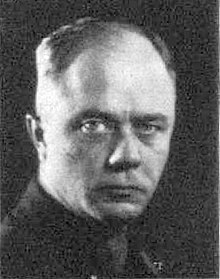Artur Görlitzer

Artur Görlitzer (born June 22, 1893 in Frankfurt (Oder) , † April 25, 1945 in Berlin ) was a politician of the NSDAP, a member of the Reichstag and deputy Gauleiter of Berlin.
Life
Origin and occupation
Artur Görlitzer's father was a railway official. Between 1899 and 1910 he first attended the seminar school in Neuzelle , then a community school and a secondary school in Berlin. Until 1914 he worked as a civil servant candidate and community official in Lankwitz, which was still independent at the time . When the First World War broke out , he registered as a volunteer. Wounded three times in the course of the war, he was awarded the Iron Cross 1st and 2nd class. Promoted to lieutenant in the reserve in January 1917, he was taken prisoner by the French in May of the same year. There he made up his military diploma in late 1919 before returning to Germany in 1920. In civil life, Görlitzer continued his career as a civil servant: initially employed again in Lankwitz, he moved to Berlin's city administration in 1921 after the incorporation of Lankwitz. From September 1922 official of the Reichsfinanzverwaltung , he worked first at the tax office in Steglitz, then at the state tax office in Berlin, finally as chief tax secretary and chairman of the civil servants' committee of the tax office in Berlin-Friedrichstadt.
Member of the NSDAP
Artur Görlitzer joined the NSDAP in 1928 . According to information from him led "experiences in the French captive" to its "claim that must be disposed radically nationally to compensate for the corresponding adjustment of the French and English, each German." In reading the anti-Semitic writings Theodor Fritsch he had the knowledge won "that the solution of the Jewish problem is the decisive vital question of the German people" .
Between 1928 and 1933 he took on higher and higher positions in the NSDAP: initially cell chairman, he rose to local group clerk and local group leader, and finally to district leader. Because of his political activities, he was removed from his position in the Reich Finance Administration in 1930; a criminal prosecution initiated in November 1931 was discontinued in August 1932. From April 24, 1932 to October 14, 1933 he was a member of the Prussian state parliament.
Member of the Reichstag and deputy Gauleiter
After the National Socialists came to power, Görlitzer became deputy Gauleiter in Gau Berlin on March 13, 1933 . Gauleiter was Joseph Goebbels , who however, because of numerous other offices as Gauleiter, limited himself to representative tasks and final decisions, especially in personnel matters. On July 11, 1933, Görlitzer was appointed to the Prussian State Council; from November 12, 1933, he was also a member of the Reichstag, which was insignificant during the Nazi era . In the SA , Görlitzer was promoted to SA group leader on November 9, 1938.
On July 20, 1934, Artur Görlitzer became a councilor in Berlin, from 1941 he was a member of the board of directors and operations manager of the local Deutschlandhalle AG and a member of the supervisory board of the Reich's Deutsche Revisions- und Treuhand AG . From the beginning of 1944 Görlitzer moved to the East Ministry under Reich Minister Alfred Rosenberg . In this function he was briefly general commissioner of the general district Zhitomir in the Reichskommissariat Ukraine in the spring of 1944 . However, this office was of no practical importance as the area had already been recaptured by the Red Army.
When Artur Görlitzer and his wife Paula committed suicide in Berlin on April 25, 1945 , the city was already surrounded by the Red Army. Her son Bruno died near Stalingrad in early 1943. Her daughter Anita emigrated to the USA after the war.
literature
- Joachim Lilla , Martin Döring, Andreas Schulz: extras in uniform. The members of the Reichstag 1933–1945. A biographical manual. Including the ethnic and National Socialist members of the Reichstag from May 1924. Droste, Düsseldorf 2004, ISBN 3-7700-5254-4 .
Remarks
- ↑ German Leader Lexicon 1933/34 Berlin, 1934. Page 149.
- ^ Lullies, Eckard: Letters from the Petzinger family: Everyday life in East Prussia and Berlin. Hentrich and Hentrich, 2002. ISBN 3933471346 . Page 339
Web links
- Literature by and about Artur Görlitzer in the catalog of the German National Library
- Artur Görlitzer in the database of members of the Reichstag
| personal data | |
|---|---|
| SURNAME | Görlitzer, Artur |
| BRIEF DESCRIPTION | German politician (NSDAP), MdR, deputy Gauleiter of Berlin and member of the Reichstag |
| DATE OF BIRTH | June 22, 1893 |
| PLACE OF BIRTH | Frankfurt (Oder) |
| DATE OF DEATH | April 25, 1945 |
| Place of death | Berlin |
